Graham Reid | | 19 min read
All The Dogs Are Barking (alt mix)
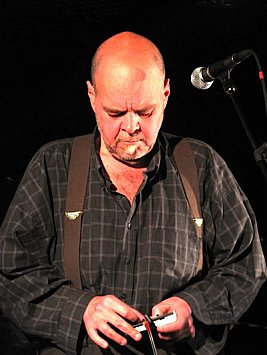
David Thomas is his customary garrulous, funny but incisive and sometimes his visibly irritated self . . . at least he would be if we could see him on this Skype call to his home in England.
Somewhere behind the screenshot of his much younger self there is muttering and mumbling as someone, who I take to be his partner, laughing and telling him to push connections.
“He's going to think I'm a moron,” he says to her.
“I don't know, everything is confused," he says to invisible me. "I'm not really good with these things. I can't stand mobile phones and this crap. I can't stand all this social media friendliness. You know when [the movie] Alien came out the motto was, 'In space no one can hear you scream' and I thought that sounded pretty damn good.
“But now in digital age everyone can hear you scream and this is not a good situation . . . because people think you care about them screaming.
“If you are screaming because you think you are a cat trapped in a human body,” he says, referring to a widely circulating article from America the previous day, “then I'm not interested.”
Behind the screen he sounds deadly serious and more than just a little miffed.
“This is the whole hideousness of it, this stupid dysfunctional woman is now famous around the planet.
“We've just endured David Bowie's death hysteria month, which is still going on it seems. I said to somebody 149,999 people also died that day . . . and that's a basic factual statement. And then you get bombarded by trolls and anonymous monsters. Whatever.
“Oh, there it is!” he says when the video connection is made.
And there he is.
Thomas – 62, bald, still portly (in his first band Rocket From the Tomb he billed himself “Crocus Behemoth”) and smiling cheerfully – is one the most interesting characters in rock culture, although in a previous interview with Elsewhere in '99 he was dismissive of the idea that there was any kind of "rock culture".
Let's just say that as much as Frank Zappa, Thomas has sought to redefine and extend the contract of music into a world where all sounds are equal. Where noises, whistling, snatches of shouted words, mad synth rushes and his screaming voice co-exist with danceable funk and sometimes truly terrifying music.
 After the short-lived (but sometimes
resurrected) Rocket he came to attention with Pere Ubu out of his
hometown of Cleveland, whose extraordinary music was described as
“the sound of things falling apart” and was, at the very least,
challenging.
After the short-lived (but sometimes
resurrected) Rocket he came to attention with Pere Ubu out of his
hometown of Cleveland, whose extraordinary music was described as
“the sound of things falling apart” and was, at the very least,
challenging.
The reason for talking with Thomas – not that any is ever needed – is the reissue of the early Pere Ubu albums in two, four LP box sets as Elitism for the People (out now, reviewed here) and Architecture of Language (released March 18), another Pere Ubu road show (The Co-Ed Jail Tour) , and the packaging up of albums by yet another of his projects, David Thomas and The Two Pale Boys, all through Britain's Fire Records.
All of this music comes from the
periphery of rock and despite the best efforts of critics  who
frequently acclaim Thomas' music (Elsewhere among them) it seems
destined to remain there.
who
frequently acclaim Thomas' music (Elsewhere among them) it seems
destined to remain there.
But, as he will tell me, he enjoys the acclaim of his peers, notably the lyricist and arranger Van Dyke Parks.
“One of the things that keeps me going through the long black nights of the soul is about five or six years ago Brian Wilson [of the Beach Boys] was bringing his thing to the Royal Festival Hall and Van Dyke was along with him and he took me backstage to meet Brian.
“And he said to him, 'Brian, I'd like you to meet the other American genius, David Thomas'. And so all this shit I gotta deal with in order to do what we do, every so often I sit there and think, 'Van Dyke once said . .. blah blah blah'. “
David, I do want to ask you about the Pere Ubu reissues but first, I understand Two Pale Boys played in London the other night. Was that the first time you've played in a while?
Yeah, it's sort of the return of Two Pale Boys. It went very well actually. There should be a new Two Pale Boys album starting soon, then I'm starting on a new Pere Ubu record and I better start on the new Rocket From The Tomb record soon.
I wish I could combine them onto one album like they used to with a bunch of artists on the one album.
But given you are in the larger Ubu context you cold almost do that.
I could . . . if I wanted to get things even more confused.
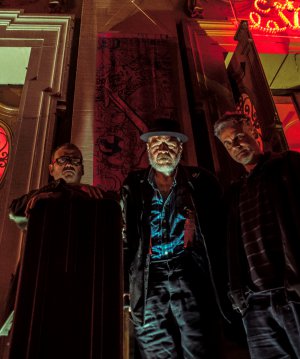 The Two Pale Boys is not just a
clear separation for your audience but also for you in that they and
Ubu work in very different ways?
The Two Pale Boys is not just a
clear separation for your audience but also for you in that they and
Ubu work in very different ways?
Yeah, although they increasingly merge. To me they are all the same thing. This is something I said on the internet years ago which is the only thing I've ever said which has gone semi-viral , I said 'Pere Ubu is like a cup' and I explained that you can look at a cup this way or that way, and some ways [gestures looking at a cup from the bottom] you'll think, 'That's not very good, what am I going to do with that?'
But it's all the same cup, you just look at it from different angle.
That is sort of the one idea which is basically everything I've been doing for the past 40 years. Each of them – Pere Ubu, Rocket and Two Pale Boys – is a different view of the same cup and I'm equally comfortable with all of them. Each one allows me to do something I like doing which I can't do to the same degree in one of the other bands.
The great advantage of Pale Boys is you get rid of bass and drums. Bass and drums are really the things that tie things down.
That is really only a recent development in music, the idea that the bass and the drums should be tight and play together and that time should be metronomic.
Drummers as metronomes, as time keepers, is probably not much older than the 1920s. In classical music the drummer wasn't there to keep time, the drummer was there to create ambience or atmosphere, a purely expressionist vehicle.
The idea that somebody had to keep time was ludicrous. Everybody understood time, the conductor waved his arms and everyone kew the time.
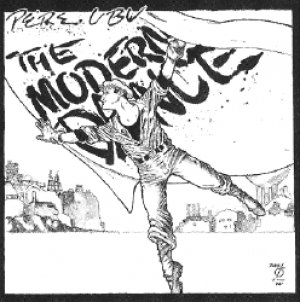 This is a very disturbing thing I am
working hard on. Really the goal now for somebody like me is to
destroy digital metronomic time. You can't wind the clocks back –
I'm not a Luddite by any stretch of the imagination – but the
solution is simple and occurred to me the other day: That old thing
of, which is the more accurate, a clock that is always a minute late
or a clock that is stopped?
This is a very disturbing thing I am
working hard on. Really the goal now for somebody like me is to
destroy digital metronomic time. You can't wind the clocks back –
I'm not a Luddite by any stretch of the imagination – but the
solution is simple and occurred to me the other day: That old thing
of, which is the more accurate, a clock that is always a minute late
or a clock that is stopped?
The clock that is stopped is clearly more accurate because it is right twice a day, which is an infinite amount more than zero.
It's clear to me that the concept of digital metronomic time is like a clock that is always running a minute late.
 Metronomic time is out of time with
organic time, and that should be obvious. So the goal now for Pale
Boys is we are going to have to flip this baby around and I'm not
going to pick cotton on the metronomic time plantation any more,
honey!
Metronomic time is out of time with
organic time, and that should be obvious. So the goal now for Pale
Boys is we are going to have to flip this baby around and I'm not
going to pick cotton on the metronomic time plantation any more,
honey!
So we are working on that. (laughs)
It'll be like when Einstein did the general theory. He explained clearly that gravity is not something that is pulling you down, it is something that is pushing you up. All these will come together one magnificent day (laughs).
In that great unknown future. I see Fire Records are putting out the Two Pale Boys records in a box later this year.
They are putting them out, but I doubt they will be able to stick to the schedule. The president of Fire said to one the staff, and I heard about this, that they were “now in the business of David Thomas”. (laughs) But yes, it's all going to be out.
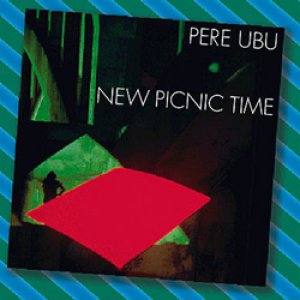 It must be gratifying for you these
Ubu box sets?
It must be gratifying for you these
Ubu box sets?
I am delighted. We spent a lot of time, and Fire
is very encouraging, on the process of really getting the transfers
right and to the highest resolution from analog to digital. I am
especially pleased with the New Picnic Time album [from 1979].
I'd always thought Dub Housing [from 1978] is probably the masterpiece from that period but then I had this chance to look into New Picnic Time again with good sound and I realised that is the masterpiece, that is as close to the flame as that band achieved. The flames were licking our wings at that point.
One person called it the scariest record ever recorded, which is probably hyperbolic . . . but it's certainly out there. In a lot of ways it is like our Al Green record.
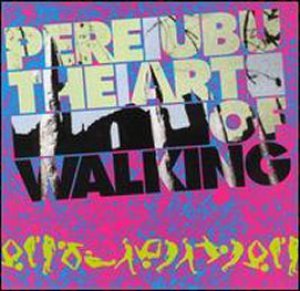 I remember we were thinking (laughs) .
. . Al Green was really big then and we really into Al Green and we
had this notion of doing a soul record. But by the time you pass
that idea through the Pere Ubu mechanism that [New Picnic Time] is
what it comes out as (laughs)
I remember we were thinking (laughs) .
. . Al Green was really big then and we really into Al Green and we
had this notion of doing a soul record. But by the time you pass
that idea through the Pere Ubu mechanism that [New Picnic Time] is
what it comes out as (laughs)
I have to say that they do sound terrific and much more immediate. I have the albums on record and while we might say analog vinyl is the way to go I think sometimes that digital processing brings out the sound much better.
I remember the vinyl days from living it, and I remember how utterly crushed we were when things came back. We had good, top of the line people mastering the records but they tend to put the bass drum down the middle and so on.
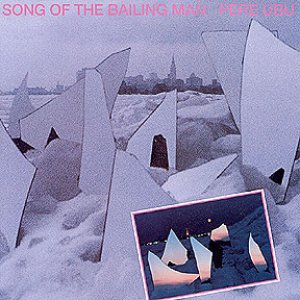 Those [early Ubu] albums were some of
the last gasp of the stereo age. People say, “Oh we've got stereo
now”. We don't have stereo now, we have enhanced mono.
Those [early Ubu] albums were some of
the last gasp of the stereo age. People say, “Oh we've got stereo
now”. We don't have stereo now, we have enhanced mono.
The stereo age really only last five, six or seven years. By the mid Seventies FM radio had some along, those bastards. I blame them for the state of the snare drum now. The snare had to have this thing which sounded good on FM radio, but it didn't sound good.
One of the things I have enjoyed about all the albums is discovering how danceable they are. There is a lot of funk and dance on them, The Modern Dance if you will.
I know. (laughs) This is one of the great tragedies of Pere Ubu. We understood pop music but at the same time we loved noise and abstract sound, so to us there was never this schizoid thing of opposites, why wouldn't you love pop and why wouldn't you also love noise? What's the difference?
 All sound is created equal.
All sound is created equal.
Like Jimi Hendrix opening for the Monkees? I was around at that time, I didn't think that was so weird. So. . . ? And . . . ?
The problem Pere Ubu had back then was everyone was caught up in the weirdness of it all, they were hearing the differences but didn't get the pop end of things. I suspect I was part of that problem too.
Well, everybody is part of the problem (laughs). That's one thing I did notice in immersing myself in these thing albums: there were a lot of pop backing vocals and they were all danceable little ditties. I don''t have anything to apologise for because I liked all of that stuff.
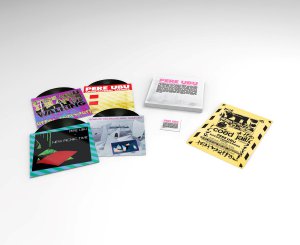 That's the problem which started
happening in the Seventies.
That's the problem which started
happening in the Seventies.
Whatever the latest fad out of England was – glam rock or whatever and then some other thing – came along. I don't have a problem with that because that is the pop mechanism, the thing I have a problem with is – and now I start to sound like an old fart, and I really hate doing that because I am not an old fart because I haven't compromised. I have kept going forward no matter what the damn price to myself is.
But what I remember in my youth was that fashion would recycle every couple of years. Nothing has changed since 1990., not a single teeeeeeny little thing has changed in 25 years. Don't you think that is bizarre?
All you get is things are ever more refined, like how many angels on the head of a pin, or Trotsky versus Lenin . . . and if you could ever understand the difference you are born for the digital age.
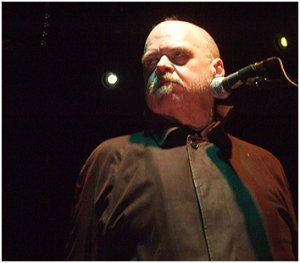 As I said before we started, I went
to a rock festival yesterday and all the dance acts became very
reductive.
As I said before we started, I went
to a rock festival yesterday and all the dance acts became very
reductive.
I start listening to radio every time I have an album coming out just to find out how far out of touch I am. And I am always gratified to find that I am really far out of touch (laughs).
I listen to talkback radio and joke with my wife that I do it so I know what my enemy is thinking.
Sure, keep your enemies closer than your friends. But even the notion of enemies? I don't talk about enemies n political or social senses because I don't have much patience for that. Enemy is a big word and you better be careful when you use a word like that. Just because somebody doesn't agree with you . . . so what?
Exactly, that's why I said I joke about it. It is just to hear what other people are thinking.
I have no problem with what other people think. I don't have to agree with you and you don't have to agree with me and what the hell difference does it make?
All I get upset about is having to pay for your stupidity, but okay, fine, this is the way life. You gotta pay for that stuff. The American constitution says precisely that, everybody is allowed to be as stupid and delusional as they want to be. The caveat that everybody ignores these days is that I don't have to pay for it.
I don't have to pay for his woman who believes she is a cat trapped in a woman's body, but now I'm sure I'm gonna have to somehow.
It's interesting that you have gone your own way and paid the price . . . but the reward is that you have done exactly what you wanted to do. That is reward in itself.
Exactly. I explain that to people and they think you are being arrogant or selfish in some way. I'm not a role model or a responsible human being, I am a musician!
I hate to pick to pick on Sting or Bono but they are the model of this thing, or Hollywood actors. Do you think these people have any grip on reality and that you should listen to what they say about ANYTHNG? You are a lunatic if you do.
 I paid the price – and continue to
pay the price. But that's okay.
I paid the price – and continue to
pay the price. But that's okay.
It's like when we did Dub Housing. There is a semi-famous story that our manager Cliff Burnstein came to the studio to hear the mix. He later discovered a band called Metallica, his new discovery then was Def Leppard who he brought to our soundcheck to show them how it was done . . . in the heavy metal world he's Mr Big.
He came to the studio and aid to us, “This is brilliant. You do this album two more times and you are going to be huge stars”. And [keyboard player Alan Ravenstine] said, what if we don't want to do it again or – more to the point – what if we can't do it again? And Cliff said, “As long as you make good music somebody is going to want to put it out”.
Now he didn't know what a disastrous thing it was to tell us that, because we just thought, “Oh you mean we can do what we want and somebody will put it out?”.
So it was that, or do the same thing over and over and be rock stars? He said, “Yeah”. So we didn't have any choice from that point onward, it was the worst thing in the world he could have told us. (laughs)
I always believe if you put your art into the world it will find its audience.
True. This is the mystery of the record store. I remember going into a record store for the first time and they had the clerks up on a raised podium like they were high priests. You'd go through the bins and it was all a world of mystery, you'd look at the front and back of a cover and you'd buy because of the cover!
Then you would trepidatiously take it to the high priest at the checkout hoping he would approve of your purchase, you wondered whether you were worthy. It was all mystery.
A musician stripped of mystery is simply a used car salesman. Mystery is what it is all about. In the digital age there is little room for mystery.
That is why we have this motto now for the Co-Ed Jail tour: “We don't promote chaos, we preserve it”.
Chaos and mayhem are in danger. Now mayhem has a bad connotation but it also has another connotation: When you are getting this chaotic input all the time, for a human being there is no alternative to making sense of things, this Skinnerean Behaviouralism, it is at the root of the UFO phenomenon.
The bell rings and human being salivate meaning. You put a bunch of unconnected stuff in front of a human being and they are going to connect it all until it means something. That is the power of mystery, the power that rock music has if you integrate music and abstract sound.
You create questions and the listener has no choice but to answer the questions.
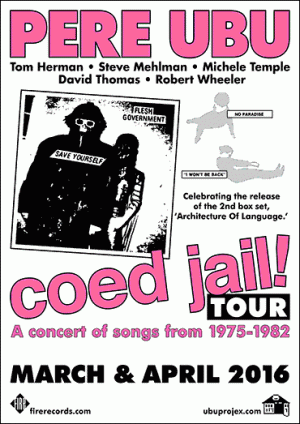 You mentioned going back out on
tour, do you look forward to that?
You mentioned going back out on
tour, do you look forward to that?
Well . . . it made sense to go out and promote the boxes and to bring Tom [Herman, guitarist '75-'79 then '97-'02] back in the band. He's been in since about 10 years ago. It's not like we do this stuff all the time so it will be interesting to go back and play those things.
It's not a greatest hits tour, Tom chose the songs and knowing Tom he probably chose those ones because he could play them easily. (laughs)
Do you have to relearn those songs from almost 40 years ago or they embedded in you?
I'm sure it's like riding a bicycle. I'm going to have to remember if I come in after two or four or six or whatever but my drummer knows all that stuff so I just turn to him and say, “Do I come on the two?”
We're going to find out when I go to Cleveland to rehearse. I don't imagine it's a problem. I know the songs, it's not like learning something alien and we've been together for decades and Tom and I for even more decades.
It's all going to fall into place then.
Well, it certainly is going to fall, because we am it! It's not like learning somebody else's songs and the people who were too young to be out of elementary school at the time like Steve [Mehlman], all he's done for 20 years is be in Ubu so he's indoctrinated into the process.
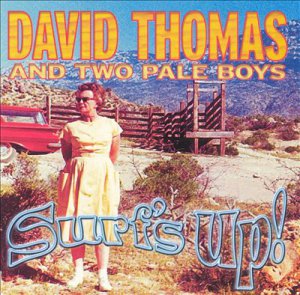 You mention doing other people's
songs and it interested me that you are a Brian Wilson fan and Two
Pale Boys did a version of Surf's Up which I always thought lyrically
was one of the most extraordinary songs. You haven't done may
covers, why that one?
You mention doing other people's
songs and it interested me that you are a Brian Wilson fan and Two
Pale Boys did a version of Surf's Up which I always thought lyrically
was one of the most extraordinary songs. You haven't done may
covers, why that one?
Number one, I love Van Dyke Parks and I love those lyrics [he wrote]. It's a different kettle of fish than Surfing USA.
You know, I was suppose to ask Van Dyke Parks to produce the World in Collision album and I went out to LA and sat in a hotel room for three days trying to get up the nerve to call him. I finally I got up the nerve to call and it rang and he answered . . . and I hung up without saying anything! That is one of the regrets of my life.
One of things that keeps me going through the long black nights of the soul is about five or six years ago Brian Wilson was bringing his thing to the Royal Festival Hall and Van Dyke was along with him. He took me backstage to meet Brian and he said to him, “Brian, I'd like you to meet the other American genius, David Thomas”.
So all this shit I gotta deal with in order to do what we do, every so often I sit there and think, “Van Dyke once said . .. blah blah blah”. (laughs)
 I want to ask you about an album I
know you didn't participate too much in and this was the album Why I
Remix Women [a remix of the '07 album Why I Hate Women]. It was more like
a collage of various Ubu pieces rather than a simple remix of the
songs. It seems the technology now is so much better than when you
first started Ubu that it is allowing you to do things that maybe you
once had in your head but couldn't realise.
I want to ask you about an album I
know you didn't participate too much in and this was the album Why I
Remix Women [a remix of the '07 album Why I Hate Women]. It was more like
a collage of various Ubu pieces rather than a simple remix of the
songs. It seems the technology now is so much better than when you
first started Ubu that it is allowing you to do things that maybe you
once had in your head but couldn't realise.
There's a very interesting thing on the new Architecture of Language box. There's an alternative mix of All the Dogs are Barking [off New Picnic Time]. Now that song started off as basically a standard pop song but there was a division in the band that was straining to go off somewhere . . . and this is the mix right before the one that went on the album, you can hear the mix tearing itself apart.
We were doing things in the playing and mixing that really do foretell sampling. We were playing sampling as it were, we were mixing sampling with the capability of the desk at the time.
There's a lot of stuff where I would cut off lines in the middle of a word with the tape machine that really do foretell some of the technology that was going to happen. I like being in control of things, I like remixing.
All sound is created equal and I like to hear it all.
In the early days of CD this is what we were promised. Our engineer Ken was doing a lot of work in those days on digital sound, he actually designed and built a converter which studios still use because of its warmth. He was telling us about this new technology, the compact disc. The technology was going to be there that the consumer would be able to mix in four or eight tracks, you could mix them yourself.
I remember that.
Well, didn't they get rid of that pretty quickly. But that was supposed to be part of the vision of it. I thought it was brilliant because I would like to sit there and fiddle with the thing. Instead we got these stupid EQ knob and graphic equalizers . . . I hate those things, I mean, “Who are you”?
 One thing I learned about these English
hi-fidelity amp makers, they wouldn't have any of that stuff, just a
clean amp with on/off and a volume knob. That was all they had
because the attitude was “Who are you to screw with the sound?”
And I thought these English had it together?
One thing I learned about these English
hi-fidelity amp makers, they wouldn't have any of that stuff, just a
clean amp with on/off and a volume knob. That was all they had
because the attitude was “Who are you to screw with the sound?”
And I thought these English had it together?
It was the Japanese who came up with all these controls. Fair play to them, but it's the wrong idea.
David, you have chosen to live in
Britain for a very long time now. I was watching a documentary about
Gore Vidal who said it was only when he moved to Italy where he wrote
all those great books about America, that he could write with a
greater perspective about the United States. You find living away has
given you a different or better perspective on American music or
culture?
No. I'd
like to say you are right, but from a very young age I understood I
lived in ghost town and I understood the nature of modernity which
leaves in its wake ghost towns. The common misconception is that a
ghost town is a somewhere that nobody lives. Nah.
A ghosts town is town inhabited by ghosts. So how do you become a ghost, it's when you are caught in the deadpool of time or you've climbed up on the banks of time.
We all live in ghost towns. The things of my childhood which were landmarks and places of mystery are gone, hundreds of places have been taken away through urban renewal of whatever . . . so you are left with trying to buy a loaf of bread in shop that no longer exists.
This is in metaphorical terms but also in what you might call spiritual or psychological levels too. But I always put things in terms of solid objects or geography, and who is to say these [solid] things aren't as metaphysical as ideas?
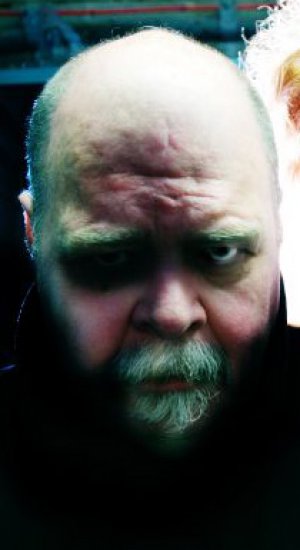 So we all live in ghost town. The
importance of a ghost town is it goes with you wherever you want to
go, it is with you. So the ghost town that is Cleveland is still with
me, I can't get rid of it. It's not like I even have a choice.
So we all live in ghost town. The
importance of a ghost town is it goes with you wherever you want to
go, it is with you. So the ghost town that is Cleveland is still with
me, I can't get rid of it. It's not like I even have a choice.
You are touring but I guess there is
no plan for you to come down here again? It was '99 the last time you
came I think.
I'd have to get paid. I'd love to come back
down. I liked New Zealand and Australia but I had a fondness for New
Zealand because it to me is the Cleveland of the Pacific You can't
really call Australia the “New York of the Pacific”, but in
relativistic terms Australia is where everybody goes because they've
got [sneeringly dismissive tone] Sydney and Melbourne and those
places.
But New Zealand is this pokey place just off the edge that you can fit in if you've got the time or something. So it's like Cleveland.
I don't know anything about the South Island but I imagine it as being like Cleveland, just not as cool. (laughs)
Maybe we are a ghost country?
We are all ghost countries too. Now you got all that Tolkien crap. You are going to have live that down for the rest of your lives.
Elitism for the People is available on download (the vinyl has sold out) through Fire Records here. The second volume of the Pere Ubu reissue is Architecture of Language 1979-1982 also through Fire due March 2016 (available on pre-order now). Elsewhere will review that on release.
Keep an eye on the Fire Records website, these are the people who -- among other things -- released the recent Chills album Silver Bullets (and their excellent BBC sessions) and the JPSE complete works (which were acclaimed at Elsewhere) as well as . . . just heaps of great stuff, new and reissued.
Fire comes through Southbound in New Zealand. Make the call, if you fink you is 'ard snuff.

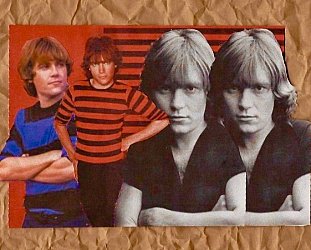



post a comment